
Drugs Habits and Social Policy
Scope & Guideline
Shaping the Future of Public Health Discourse
Introduction
Aims and Scopes
- Drug Policy Analysis:
The journal provides critical examinations of drug policies across various contexts, assessing their implications, effectiveness, and social justice outcomes. - Cultural and Social Dimensions of Drug Use:
Research focuses on understanding the cultural narratives and social behaviors associated with drug use, including the impact of stigma, identity, and community practices. - Mental Health and Substance Use:
There is a significant emphasis on the intersection of mental health and substance use, exploring how these factors affect individuals and communities. - Harm Reduction Strategies:
The journal advocates for harm reduction approaches, highlighting innovative practices and policies aimed at minimizing the negative health impacts of drug use. - Legal and Ethical Issues:
Exploration of legal frameworks related to drug use, including rights of individuals, access to treatment, and the implications of criminalization. - Global Perspectives:
The journal aims to incorporate diverse global perspectives on drug use and policy, addressing issues in various cultural and socio-economic contexts.
Trending and Emerging
- Psychedelic Research and User Perceptions:
An increasing number of studies are exploring the perceptions and uses of psychedelic substances, reflecting a growing acceptance and interest in their therapeutic potential. - Impact of COVID-19 on Substance Use:
Research examining how the pandemic has affected patterns of drug use, mental health, and access to services is gaining traction, highlighting the need for responsive policies. - Legalization and Regulation of Cannabis:
With the ongoing discussions around cannabis legalization, there is a surge in research analyzing its implications for public health, economy, and social justice. - Integration of Technology in Drug Policy and Treatment:
The role of digital technologies, including telehealth and online support systems, is increasingly being recognized as a vital area of research in drug treatment and policy advocacy. - Community-Led Initiatives and Grassroots Movements:
There is a growing emphasis on the role of community-led harm reduction and drug checking initiatives, reflecting a shift towards participatory approaches in drug policy.
Declining or Waning
- Traditional Substance Abuse Models:
There is a noticeable decline in research focused solely on traditional models of substance abuse, as the field moves towards more holistic and integrative approaches. - Stigmatization of Drug Users:
While stigma remains a critical issue, the direct focus on stigmatization as a standalone topic has waned, as the conversation shifts towards more constructive narratives and recovery. - Alcohol Use Disorders in Isolation:
Research specifically centered on alcohol use disorders, without the context of broader substance use or mental health issues, appears to be decreasing. - Single-Drug Focus Studies:
Studies that focus exclusively on the effects or policies surrounding a single drug, without considering poly-drug use or broader social implications, are becoming less frequent.
Similar Journals
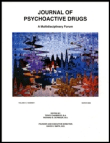
JOURNAL OF PSYCHOACTIVE DRUGS
Exploring the Complexities of Psychoactive SubstancesJOURNAL OF PSYCHOACTIVE DRUGS, published by Routledge Journals, Taylor & Francis Ltd, stands as a leading resource in the fields of psychology and medicine, focusing on the intersection of psychoactive substances and their impact on human behavior. With an ISSN of 0279-1072 and E-ISSN 2159-9777, this esteemed journal has been a pivotal platform for rigorous research since its inception in 1967, contributing to the understanding of drug use, its societal implications, and therapeutic potentials. It currently holds a Q2 ranking in both the miscellaneous categories of Medicine and Psychology for 2023, reflecting its significant standing within academic circles. Moreover, its Scopus rankings place it at the 49th percentile in General Psychology and 101st in Medicine, underscoring its relevance in contemporary research. Although it is not available via Open Access, the journal maintains a commitment to advancing knowledge through its annual publications until 2024. JOURNAL OF PSYCHOACTIVE DRUGS is essential for researchers, professionals, and students seeking to explore the complexities of psychoactive substances and their effects in various contexts.
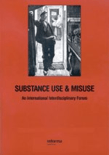
SUBSTANCE USE & MISUSE
Advancing knowledge on substance use and its societal impact.SUBSTANCE USE & MISUSE, published by Taylor & Francis Inc, is an esteemed academic journal dedicated to the multifaceted study of substance use and its implications on health and society. With a notable impact factor and categorized in the Q2 quartile across multiple fields—including Health (Social Science), Medicine (Miscellaneous), Psychiatry and Mental Health, as well as Public Health—this journal serves as an essential platform for researchers, professionals, and students alike. Spanning from 1966 to 2024, it provides a rich archive of peer-reviewed articles that explore current trends, innovative research, and evidence-based practices in the management and understanding of substance use. The journal offers various access options, catering to the diverse needs of its audience and affirming its commitment to fostering scholarly discourse in the United Kingdom and beyond. By engaging with this journal, readers can enhance their understanding of the complexities surrounding substance use, making it a crucial resource for advancing knowledge and informing policy in this critical area of public health.

Harm Reduction Journal
Connecting researchers and practitioners for global health progress.Welcome to the Harm Reduction Journal, a premier academic platform published by BMC, dedicated to advancing the field of harm reduction since its inception in 2004. With an impressive track record as an Open Access publication, this journal addresses critical topics within the broad scope of medicine, psychiatry, and public health, making it indispensable for researchers, healthcare professionals, and students alike. As of 2023, it proudly holds a Q1 ranking in prestigious categories including Medicine (Miscellaneous), Psychiatry and Mental Health, and Public Health, Environmental and Occupational Health, reflecting its high impact and significance in the academic community. The journal is notable for its comprehensive discussions on innovative harm reduction strategies, public policy considerations, and evidence-based practice, fostering collaboration and knowledge exchange. With a global reach and commitment to enhancing health outcomes, the Harm Reduction Journal serves as a vital resource in the ever-evolving landscape of public health and addiction research.

Journal of Criminological Research Policy and Practice
Shaping the Future of Criminological Policy and PracticeJournal of Criminological Research Policy and Practice is a pioneering platform dedicated to the exploration and dissemination of knowledge in the interdisciplinary field of criminology. Published by Emerald Group Publishing Ltd, this journal features high-quality research that addresses contemporary issues and innovative practices in areas such as law, public administration, and social psychology. With an ISSN of 2056-3841 and an E-ISSN of 2056-385X, the journal has garnered a notable presence in the academic community, showcasing a Q3 ranking in Law and Sociology & Political Science as of 2023. The journal provides valuable insights for researchers and practitioners alike, advancing the discourse on criminological policy and its implications for society. It serves as an essential resource for those invested in enhancing social justice, informing policy-making, and understanding the complexities of crime within a broader social context. Encompassing research from 2015 to the present and extending into 2024, the journal stands as a critical reference point for future studies and professional practice in criminology.
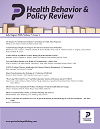
Health Behavior and Policy Review
Shaping Tomorrow’s Health Policies with Today’s ResearchHealth Behavior and Policy Review is a leading journal in the domain of health policy and public health, published by PATIS Scholar Publishing Ltd. With an ISSN of 2326-4403, this interdisciplinary journal focuses on pertinent issues in health behavior, policy analysis, and the social determinants of health, making it an essential resource for researchers, professionals, and students alike. Although it operates in the open-access realm, it is strategically positioned within the Q3 quartile for Health Policy, Health (social science), and Public Health categories, reflecting its commitment to disseminating impactful research. Covering converged years from 2020 to 2024, the journal aims to bridge the gap between academic research and practical applications in health policy, contributing significantly to the field's advancements. With increasing visibility and relevance, Health Behavior and Policy Review serves as a pivotal platform for understanding and influencing health-related behavior across diverse populations, thereby enhancing public health outcomes.

International Journal of Alcohol and Drug Research
Fostering collaboration for impactful change.Welcome to the International Journal of Alcohol and Drug Research, an esteemed publication dedicated to advancing the understanding and research surrounding alcohol and drug-related issues. Published by Ohio State University, College of Social Work, this journal serves as a vital resource for professionals and scholars engaged in social sciences, public health, and epidemiological studies. Established as an Open Access journal since 2012, it ensures that valuable research findings are readily accessible to all, promoting awareness and disseminating knowledge critical in the fight against substance abuse. With a commendable impact in the field, the journal occupies a notable position in Scopus rankings, showcasing its contribution to social health, public health, and epidemiology. Covering an extensive scope with a commitment to rigorous research, the journal aims to foster collaboration between researchers, policymakers, and practitioners, ultimately driving innovative solutions and best practices in the realm of alcohol and drug research.

Sucht-Zeitschrift fur Wissenschaft und Praxis
Illuminating the path to understanding addiction's societal impact.Sucht-Zeitschrift für Wissenschaft und Praxis, published by HOGREFE AG in Switzerland, is a pivotal journal addressing the interrelated fields of addiction science and mental health. With an ISSN of 0939-5911 and an E-ISSN of 1664-2856, this journal has been dedicated to fostering interdisciplinary research and practical applications since its inception in 1991, continuing through to 2024. As a respected source in the field, it holds a 2023 Q3 quartile ranking in Medicine (miscellaneous), a Q4 ranking in Psychiatry and Mental Health, and a Q3 ranking in Public Health, highlighting its broad relevance and growing impact on contemporary health discussions. While currently not offering open access options, the journal provides a rich platform for researchers, practitioners, and students to share and gain insights into innovative practices and scientific findings that advance the understanding of addiction and its societal implications. With its contributions indexed in Scopus and a variety of rankings reflective of its quality, Sucht-Zeitschrift für Wissenschaft und Praxis serves as an essential resource for those committed to advancing knowledge and practice in addiction-related fields.
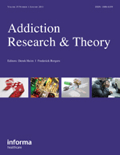
ADDICTION RESEARCH & THEORY
Fostering Knowledge, Enhancing Recovery.ADDICTION RESEARCH & THEORY, published by Taylor & Francis Ltd, is a leading academic journal dedicated to advancing the understanding of addiction through innovative research and theoretical frameworks. With its ISSN 1606-6359 and E-ISSN 1476-7392, this journal serves a diverse audience, including researchers, healthcare professionals, and students in the field of medicine. The journal, classified in the Q2 category of Medicine (Miscellaneous) as of 2023, and ranking in the 76th percentile in Scopus, demonstrates a robust impact within the community, reflecting its commitment to high-quality research and discourse. With publications spanning from 1993 to 2024, ADDICTION RESEARCH & THEORY aims to provide a comprehensive platform for the latest empirical studies, critical reviews, and theoretical discussions on addiction, making it essential for anyone engaged in this vital area of health and social issues. Although it does not currently offer Open Access options, the journal remains a critical resource for scholarly communication, contributing significantly to the fields of addiction medicine and psychiatry.
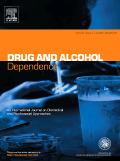
DRUG AND ALCOHOL DEPENDENCE
Transforming insights into action against substance use.Drug and Alcohol Dependence is a premier journal published by Elsevier Ireland Ltd, dedicated to the rigorous exploration and analysis of substance use disorders, including drug and alcohol dependencies. With its established history since 1975 and a remarkable convergence of research extending to 2024, the journal holds a prestigious position within the academic community, evidenced by its Q1 ranking in multiple categories, including Pharmacology, Psychiatry and Mental Health, and Toxicology for 2023. It ranks impressively among its peers, underscored by Scopus rankings of #46, #99, and #27 in key fields related to medical pharmacology and toxicology. As a non-open access title, it caters to a global readership of researchers, professionals, and students, providing them with peer-reviewed insights into critical developments and innovative methodologies in the field. The journal’s commitment to advancing knowledge and understanding of drug and alcohol dependence is essential for addressing the global challenges posed by substance use, making it a valuable resource for all stakeholders in public health and clinical practice.
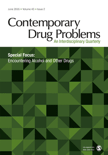
CONTEMPORARY DRUG PROBLEMS
Examining the Multifaceted Challenges of Drug UseCONTEMPORARY DRUG PROBLEMS is a distinguished academic journal published by SAGE PUBLICATIONS INC, focusing on critical issues within the realms of drug policy, health advocacy, and law. With a legacy dating back to its inception in 1973 and a noticeable convergence in subsequent years, the journal serves as a vital forum for researchers, practitioners, and policymakers engaged in understanding the multifaceted challenges related to drug use and its societal impacts. Holding an impressive Q2 ranking in both Health Policy and Health (social science), and a Q1 distinction in Law, the journal positions itself as an essential resource for advancing knowledge and fostering dialogue in these essential fields. Although it operates under traditional access models, its wide-ranging insights make it indispensable for those who aim to contribute meaningfully to the discourse surrounding contemporary drug issues. With its robust Scopus rankings, including a significant 89th percentile in Social Sciences Law, CONTEMPORARY DRUG PROBLEMS remains a pivotal source for scholars and professionals alike, striving to address and mitigate the complexities of drug-related problems on both a legal and social front.